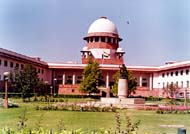Commentary/Mani Shankar Aiyar
Judicial activism has certainly given politicians an outstanding
opportunity to settle scores -- but has it advanced the cause of justice?
The way things are going, if 1996 was the Year of the Judge, 1997
might well prove to be the Year of the Judiciary's Comeuppance.
 Because all this frenzied judicial activism we have been subjected
to since the hawala scandal broke exactly a year ago seems to
be leading nowhere in regard to actually putting corrupt and criminal
politicians behind prison walls.
Because all this frenzied judicial activism we have been subjected
to since the hawala scandal broke exactly a year ago seems to
be leading nowhere in regard to actually putting corrupt and criminal
politicians behind prison walls.
On January 16, 1996, the whole country erupted in a kind of delighted
orgy of righteous indignation at the spectacle of hordes of very
senior politicians -- ministers of the ruling party as much as
stalwarts of the Opposition -- being indicted in open court --
and no ordinary court either but the Supreme Court itself -- for
serious offences which, if proved, would not only spell finish
to their unregretted political careers but so scare those whom
Fate had not as yet ensnared in its net as to usher in a new era
of clean politics.
True, the CBI had faintly pleaded an inadequacy
of evidence on which to frame its charge-sheets but the Olympian
judges of the highest court in the land put this down to political
pressure and ordered the CBI director to file charges -- or face
the wrath of our judicial gods. The CBI, of course, buckled to
this pressure from the Bench and filed a series of charges.
There
is little doubt, either, that the CBI also buckled to political
pressure and filed charges not only against those whom it had
identified as possibly guilty but also against those whom the
political establishment had identified as eminently prosecutable
in the pursuit of its own perceived political interests.
I have
it on the authority of one who claims to have been given an illegitimate
peek at the CBI's secret files that, of the 26 persons charged,
the CBI's minions had recommended that there was a case against
as many as 19 of them!
Twelve months on, not one single case has even come to trial let
alone been decided. The politicians indicted, innocent, or guilty,
are wandering around as ever. And Kamal Nath in Chhindwara, not
to mention Buta Singh in Ropar, are showing the way to political
rehabilitation for those who were politically punished for the
political crime of not fitting into the then Congress establishment's
ulterior political designs.
As for poor, pathetic Lal Kishinchand
Advani, no one is more pleased at his continuing and apparently
interminable discomfiture than his own enemies in the party ranging
from Murli Manohar Joshi on the Hindutva far right to Atal Bihari
Vajpayee on the barely-distinguishable-from-the-Congress far left.
Judicial activism has certainly given politicians an outstanding
opportunity to settle their internecine scores -- but has it advanced
the cause of justice? Advani, remember, simultaneously proclaimed
that he would not fight another election till his name was cleared
and sought an expeditious trial. The punishment he inflicted on
himself stays inflicted -- the exculpation he has sought from
the courts is unlikely to come his way till at least the next
round of elections is behind us.
Judicial activism should be concentrating on how to make the
judicial process more efficient. Instead, from the Supreme Court
down to additional sessions judges, the concentration is entirely
on showing up the executive in as poor a light as possible. Consider
the difference between the way the wheels of justice grind in,
say, England and here.
I take two cases which attracted considerable
attention in our country: the first, Amitabh Bachchan suing a
Swedish journalist in a British court for a Bofors-releated story.
Once the hearings started -- and they started as soon as the two
sides had filed all the relevant documentary evidence -- the hearings
continued uninterrupted till they were completed. Immediately
thereafter the verdict was pronounced and sentence awarded.
|





 Because all this frenzied judicial activism we have been subjected
to since the hawala scandal broke exactly a year ago seems to
be leading nowhere in regard to actually putting corrupt and criminal
politicians behind prison walls.
Because all this frenzied judicial activism we have been subjected
to since the hawala scandal broke exactly a year ago seems to
be leading nowhere in regard to actually putting corrupt and criminal
politicians behind prison walls.